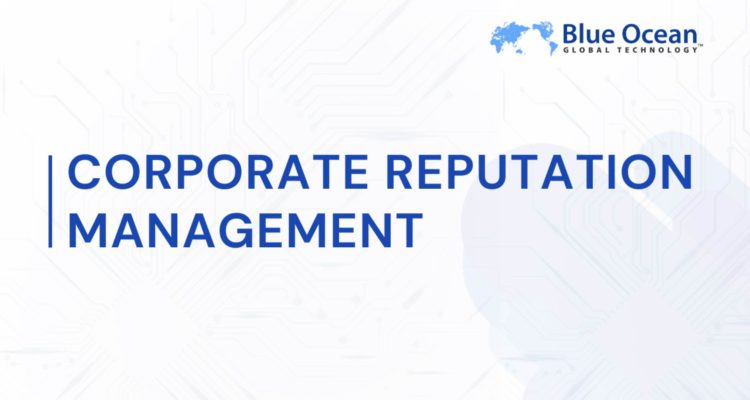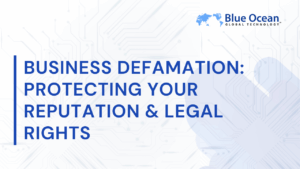Blackmail is an alarming form of coercion that can leave victims feeling trapped and vulnerable. It often involves threats of exposing private information to force financial, emotional, or other kinds of compliance. Many perpetrators use manipulation, emotional distress, and online platforms to exert pressure, making blackmail a pervasive problem in today’s digital age. Protecting yourself begins with understanding the tactics of blackmailers, avoiding emotional responses, and taking systematic steps toward resolution.
This guide provides actionable advice to help victims of blackmail navigate their situation with confidence. From gathering evidence and securing digital safety to seeking legal assistance, we cover everything you need to regain control. Blue Ocean Global Technology specializes in crisis management and offers expert solutions for victims of online threats, ensuring professional guidance at every stage of the process.
How to Recognize and Understand Blackmail
Understanding blackmail dynamics is crucial for protecting yourself or assisting someone else in need.
How Does Blackmail Work?
Blackmailers exploit personal vulnerability to gain control over their victims, utilizing tactics such as manipulation, intimidation, or deception. Their strategies often rely on psychological pressure, such as threatening to reveal sensitive information unless demands are met.
- Common signs of emotional or online extortion include receiving unsolicited threats, demands for money or favors, and messages involving intimidation or coercion.
- Blackmailers target individuals based on perceived weaknesses, such as private photos or financial information, often obtained through deception, phishing, or hacking.
- Their motivation typically revolves around monetary gain, but sometimes stems from personal vendettas or power dynamics.
Types of Online Extortion Explained
Online extortion cases have surged due to the anonymity enabled by digital platforms. Sextortion is a prominent form, distinguished by threats to release sexually explicit material.
- Sextortion differs from other types of blackmail by focusing on private, intimate images or videos.
- Common scenarios include hackers collecting compromising content or scammers fabricating fake evidence to deceive their victims.
- Social media platforms like Instagram are frequently exploited due to users sharing personal content openly or falling victim to fake profiles.

Source : Freepik
Emotional Blackmail and its Impact
Emotional blackmailers use guilt, fear, and obligation to control their victims. This manipulation can result in profound psychological stress, ranging from anxiety to depression.
- Tactics include implying shame or embarrassment will follow non-compliance, such as withholding affection or threatening public exposure.
- Victims should seek mental health support when experiencing emotional exhaustion as it can help them build resilience against ongoing threats.
Steps to Take if You Are Being Blackmailed
Taking immediate action can prevent escalation and help mitigate risks.
What Should You Do if Someone Tries to Blackmail You?
Avoid engaging directly with the perpetrator to reduce the risk of intensifying their demands. Instead, focus on establishing control of the situation.
- Confronting a blackmailer is often counterproductive and may backfire. Instead, stay composed and gather insights into their demands.
- Take precautions, such as securing sensitive content and documenting all interactions, rather than attempting to negotiate or comply with their requests.
How to Collect Evidence
Properly preserving evidence ensures that law enforcement or legal advisors can act effectively.
- Save all correspondence, such as threatening messages, emails, or social media posts that establish the blackmailer’s intent.
- Take screenshots and ensure metadata integrity, which allows investigators to verify the time and source of interactions.
- Back up the evidence securely by using cloud storage tools like Google Drive or iCloud to prevent accidental loss.
Do Not Pay the Demands
While it may feel tempting to pay the blackmailer to end the nightmare, this often emboldens them to demand more.
- Employ delay tactics, such as requesting time to “consider,” giving you an opportunity to seek professional advice.
- Reporting the blackmail immediately minimizes further threats, as authorities can disrupt the perpetrator’s actions.

Source: Freepik
Report and Seek Support
Reaching out for help is vital to stopping blackmail.
- Contact local law enforcement for cases of extortion, as they can initiate investigations or provide legal protection.
- Leverage organizations or hotlines specializing in blackmail cases and online abuse for guidance and immediate assistance.
- Cybersecurity and legal experts, such as Blue Ocean Global Technology, can further assist by addressing technical vulnerabilities and tracing blackmailers.
Protecting Your Digital Accounts and Privacy
Taking preventative actions can safeguard your digital security and reduce exposure to threats.
How to Protect Yourself from Blackmail
Staying proactive with online security prevents blackmail attempts from succeeding.
- Regularly audit your privacy settings across all social platforms and update them to limit access to personal information.
- Multi-factor authentication (MFA) provides an additional layer of security by requiring verification aside from passwords.
- Encrypt sensitive media using tools such as AxCrypt to ensure content stays inaccessible to outsiders.
Block and Report the Blackmailer
Denying a blackmailer further access is often the first step toward restoring your safety online.
- Use platform-specific tools, such as Instagram’s reporting system, to alert moderators and block all communication with the attacker.
- Reporting ensures the blackmailer’s profile or account is flagged for potential violations, reducing further activity.

Source: Freepik
Remove Compromising Content (If Leaked)
If sensitive material has already been leaked, the damage can be minimized through swift action.
- Contact hosting websites or social platforms with requests to remove compromising content. Many sites have systems to fast-track these requests.
- Professional content takedown services specialize in identifying and removing illicit material posted online, providing comprehensive solutions.
- Use online monitoring tools to remain informed about future uploads and prevent reputational harm.
Stay Secure Online: Discover Essential Digital Security Practices!
Learn more about the essentials of digital security practices to keep your information safe. Work with us today!
Legal and Professional Remedies for Blackmail Victims
Victims of blackmail can rely on legal protections and skilled professionals to facilitate resolution.
When to Involve Law Enforcement
Involving authorities is critical, especially when blackmailers pose a continued threat.
- File a police report as soon as credible threats emerge, ensuring all documentation is submitted for review.
- Investigations often include identifying the blackmailer through technical forensics or tracing payments.
- If the perpetrator resides abroad, international cooperation through cybercrime units may be necessary.
Seek Professional Help
Experts can alleviate the burden of dealing with blackmail.
- Digital forensics specialists excel at tracing online perpetrators, often recovering stolen data or identifying safe pathways for victims.
- Blue Ocean Global Technology provides crisis management services tailored to victims of online threats, offering both strategic and technical expertise.

Source: Freepik
Support Resources and Hotlines
Accessible resources provide victims with options for urgent guidance.
- Many countries have dedicated hotlines that address blackmail, sextortion, or cybercrime. These services are often free of charge.
- Online forums focusing on peer support help victims connect with others who have dealt with similar experiences.
Preventative Measures Against Blackmail
Proactive education and safety habits can reduce vulnerabilities and empower individuals to avoid becoming targets.
General Safety Online
Tech updates and security tools ensure a more safeguarded online experience.
- Schedule regular reviews of personal privacy settings on social platforms to minimize exposure risks. Having multi-factor authentication (MFA) provides an additional layer of security by requiring verification aside from passwords.
- Update devices with the latest software patches to prevent malware or other security breaches.
How to Prevent Blackmail Attempts
Caution and awareness are key components of preventing blackmail.
- Avoid transmitting sensitive material through unsecured networks or unverified contacts.
- Be vigilant when evaluating friend requests or profiles that could be fake.
What to Teach Children or Seniors About Online Blackmail
Different age groups face unique challenges, but education can serve as a defense against threats.
- Teach children about the dangers of online interactions and emphasize the importance of privacy.
- Help seniors recognize phishing scams or deceptive communication techniques, encouraging skepticism toward unfamiliar accounts.

Source: Freepik
Dealing with the Aftermath of Blackmail
Coping strategies are essential for recovery and for preventing future risks.
How Does Blackmail End?
The resolution depends on your actions and the blackmailer’s persistence.
- Choosing not to engage often diminishes the blackmailer’s resolve. Reporting them transfers responsibility to legal systems.
- Long-term outcomes improve when victims seek professional assistance and prioritize emotional recovery.
Getting Legal or Counseling Help Post-Blackmail
Accessing support after blackmail accelerates recovery.
- Legal counsel provides clarity on proceedings and updates about investigations.
- Counseling services support emotional resilience, which is crucial for rebuilding confidence.
Detailed Guidance for Leaked Content
Minimizing the impact of leaked material involves strategy and effective responses.
- Engage professional services experienced in handling reputational crises.
- Monitor online platforms for further breaches to preempt additional exposure.
Additional Tips and Resources
Answers to Common Questions
- If you’re being blackmailed on Instagram, block and report the account, preserve evidence, and contact law enforcement immediately.
- Finding a way out of blackmail begins with reporting threats to authorities who can interrupt the process before demands increase.
Delay Tactics and Legal Considerations
Delaying payment gives leverage back to the victim.
- Legal intervention becomes essential when delay tactics fail or threats escalate. Professional advice should guide major decisions.
Conclusion
According to a 2024 study by Stanford University, social media vulnerabilities are a leading gateway for online extortion, underscoring the importance of digital education and awareness. Blue Ocean Global Technology offers the expertise needed to navigate and overcome online blackmail, ensuring victims regain control and confidence.
Frequently Asked Questions
1. What is blackmail?
It is a form of extortion where a person threatens to reveal harmful information unless their demands are met. It typically involves coercing the victim by threatening to expose embarrassing, damaging, or private information. The act is unlawful and is treated as a serious crime in many jurisdictions.
2. What should I do if I am being blackmailed?
If you are being threatened, it is crucial to take immediate legal action. Contact law enforcement to report the crime and provide any evidence, such as communications or threats. Additionally, seek legal counsel to understand your rights and explore further actions. In cases involving defamatory content, consider issuing DMCA takedown notices or cease and desist letters to halt the aggressor’s actions.
3. How can I protect myself from blackmail?
Protecting yourself involves several preventative measures. Safeguard your personal and sensitive information by using secure communication channels and being cautious with online services. Implement strong digital security practices, such as using unique passwords, enabling two-factor authentication, and installing antivirus software.
4. How can I manage my online reputation after being targeted by blackmail?
Managing your online reputation involves creating and promoting positive content, such as blog posts, guest articles, and social media updates. Furthermore, monitoring your digital presence and addressing negative content professionally also helps. Utilize press releases to highlight positive news and achievements, and seek media coverage to counterbalance any negative information. These actions can help restore and maintain a positive online image.
Take Control of Your Online Reputation: Learn How to Manage and Improve Your Digital Presence!
Secure your online reputation with our professionals. Ensure your digital presence is in safe hands.












